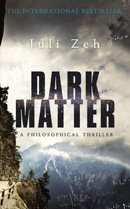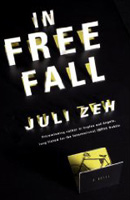
There's a commonly-held perception that suspense novels are light reading, unchallenging brain candy for those in search of a bit of pulse-quickening excitement in the airport. Juli Zeh, a bestseller and multi-award winner in her native Germany, has decided to turn this notion on its head by writing a suspense novel about quantum physics.
The plot of Dark Matter hinges on an incident that is the stuff of every parent's nightmare. Physicist Sebastian is taking a quick break at a service station when he receives a phone call from a mystery woman: "Tell nobody... Leave the building now. I'll call you back immediately." His car is gone - with his son Liam inside it. As he disbelievingly contemplates the "unbearably empty" space, his phone rings again. "Dabbeling must go." And with this "three word sentence", Sebastian's fate is decided: to ensure the safe return of his son, he must kill a man.
The characters in Dark Matter, as demanded by the conventions of suspense writing, are slightly larger than life. This is especially true of the detectives: cartoon-figured Rita Skura's near-pathological need to believe absolutely in others' honesty fuels her methods of detection, while Schilf, suffering from a terminal brain tumour, is utterly reliant on the whims of coincidence to help him to a solution. Sebastian, although now an apparently happily-married family man, has a complex relationship with the improbably stylish Oskar (variously, Sebastian's friend, lover, colleague and rival). Their backstory is filled in subtly over the course of the book's opening pages, which describe the latest in a series of regular family dinners that Oskar attends at Sebastian's Freiburg flat.
Zeh is also careful to include moments that demonstrate Sebastian's capacity for rage and violence, lest the notion of a seemingly mild-mannered scientist resolving on cold-blooded murder appear too implausible. And yet we're compelled to sympathise with him: to Sebastian, the crime he must commit seems logical, the only possible option. Dark Matter plays constantly with the ideas of free will versus determinism, reality that is altered through the act of its apprehension, and multiple alternative universes - the 'Many Worlds' theory that Sebastian has found himself, somewhat reluctantly, defending in the media. Just occasionally, the science risks weighing the action down - the long scene in which Sebastian explains his theories to Detective Schilf, for example, doesn't seem to serve much of a purpose in terms of furthering the action or characterisation (although it's one of the most accessible explanations of a scientific idea that you're likely to encounter this year).
Yet for the most part, Zeh skilfully embeds these themes in the structure and style of the novel.
The formal "in which..." chapter summaries and neat prologue are challenged and undermined by the
text's questioning of itself. Time and space are fragmented, as Zeh splices together moments that
are in fact widely separated in time and geography to destabilise the otherwise measured progression
of the narrative. Although it's clear fairly early on 'what' is actually going on, Dark Matter
serves up a compelling and fascinating exploration of 'why' and 'how'.
For our readers in the UK, Juli Zeh will be speaking at Goethe Institut in London on 11 March.
Download this page as a pdf


Harvill Secker, paperback, 9781582435794
Published in the US under the title In Free Fall
Random House, hardcover, 9780385526425 (April)